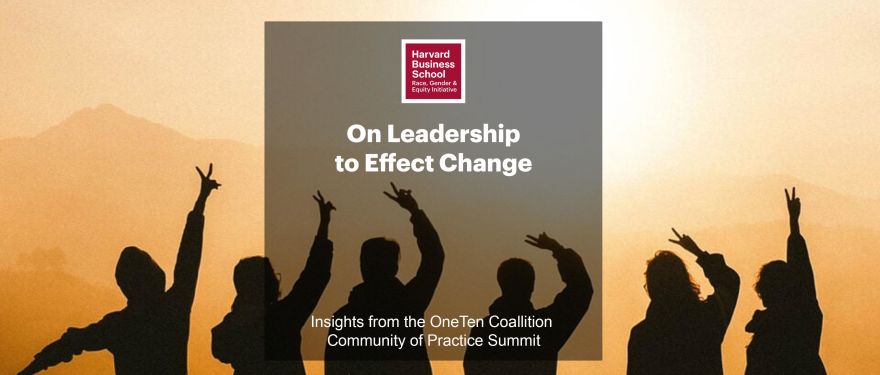In March, the Race, Gender & Equity Initiative hosted the employers who make up the OneTen coalition for a Community of Practice Summit at Harvard Business School. These industry leaders gathered with Harvard faculty to explore how to change the way we hire, promote, and lead talent — and how we can make all companies more equitable. The summit revealed insights ranging from how neighborhoods can determine one’s life trajectory to how four-year degree requirements disproportionately disadvantage Black talent in the workforce. We’ve compiled key takeaways below:
Leading the Way: Decision-Making for Workplace Equity
Addressing racism in the workplace is a complex issue, but it's essential for promoting a fair and inclusive environment. Many people, particularly those who identify as white, may not be aware of the subtle and unconscious ways that racism can influence our organizations.
By following a five-stage process called PRESS developed by Harvard Kennedy School Lecturer Robert Livingston, leaders can work toward creating a more equitable workplace:
- First, be aware of the problem
- Then, analyze the root causes
- Develop empathy for those affected
- Implement strategies to address the problem
- Finally, prepare to make some sacrifices to ensure their success
Read this Article about How to Promote Racial Equity in the Workplace
Swapping Degrees for Skills
Companies are increasingly desperate for workers. As they struggle to find people with the skills they need, their competitiveness and growth prospects are at risk. At the same time, an enormous and growing group of people are unemployed or underemployed, eager to get a job or increase their working hours. However, they remain effectively “hidden” from most businesses that would benefit from hiring them.
Harvard Business School has partnered with the OneTen Coalition to address the racial wealth gap in the U.S. by advancing Black workers without traditional four-year degrees into family-sustaining jobs. Read the "Hidden Workers: Untapped Talent" report from the Managing the Future of Work Project at Harvard Business School, led by Professors Joseph B. Fuller and William Kerr, for insight into cutting-edge hiring practices that can uncover hidden talent pools, close skills gaps, and improve diversity.
Read the Report about Untapped Talent
Community Building for Economic Mobility
A study from Harvard researchers led by Professor of Economics at Harvard University RajChetty suggests that childhood friendships can significantly impact economic mobility later in life. Individuals who grew up in low-income neighborhoods but maintained strong friendships with those who moved into higher-income neighborhoods had a better chance of upward economic mobility than those who did not maintain those connections. The research suggests policies promoting residential integration and community building could help facilitate these cross-neighborhood friendships and promote economic mobility.
To learn more about this big data study on the science of economic opportunity, visit Opportunity Insights.
Read this Article about Economic Success
CEOs Direct Change
Skills-first: it’s a way of reimagining the labor market to unlock new jobs and new pipelines with a diverse array of candidates. Taking a skills-first approach means focusing more on people’s skills and competencies than their degrees or prior job titles. 72% of Black Americans do not have a four-year degree, according to the 2021 US Census. Consequently, this large population segment is overlooked when it comes to many of the jobs that pay a family- sustaining wage—even though, according to companies’ own analyses, workers without degrees can perform just as well or better than degreed workers in those roles. In a recent episode of HBR’s IdeaCast, OneTen founding co-chair and former IBM CEO Ginni Rometty talks about how she implemented a transformational, skills-first strategy.
For more, check out this recent Harvard Business Review article featuring Rometty, authored by HBS Professor Boris Groysberg and RGE Director Colleen Ammerman.







